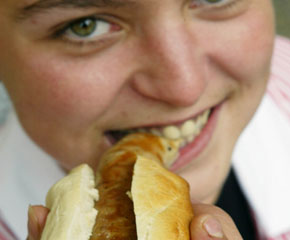For the past 15 minutes you’ve had only one thing on your mind – that chocolate bar in your drawer. In fact, it’s practically shouting at you. But you promised yourself that this time you were going to stick to your healthy eating plan.
Cravings can be powerful
They can consume you. And they’ve got nothing to do with hunger, says Cape Town lifestyle consultant, Sandy Goldberg.
‘Banning certain foods from your diet will often make you crave them more. And these cravings are usually linked to your emotions,’ Sandy says.
You need to deal with the underlying emotional issues and once you do, you will be able to control your cravings.
Demystifying cravings
Here’s why you may crave these foods:
Chocolate: Feeling depressed or unloved, a hormonal shift during your menstrual cycle or a lack of energy.
Curb it: Exercise to increase serotonin levels, drink ginger ale or soya milk, or eat low-fat or fat-free chocolate substitutes such as frozen yoghurt.
Dairy products (including ice cream): (including ice cream) Experiencing resentment, frustration or depression.
Curb it: Eat a nutritionally balanced diet as depression sometimes stems from vitamin or mineral deficiencies. Exercise. Keep a journal to try and pinpoint the emotional problems. If this doesn’t help, get professional help for depression.
Salty snack foods: Salty cravings could be caused by stress, anger or frustration.
Curb it: Address the source of your emotions. Eat crisp vegetables dipped in a low-kilojoule dressing, or wait about 15 minutes before eating. Confide in a friend or see a counsellor if needed.
Bread, pasta and rice: Such cravings could relate to stress, fear or tension.
Curb it Eat small carbohydrate snacks such as rice cakes or popcorn.
Sweets: Relates to feelings of boredom, anger, stress, frustration or when you need an energy boost.
Curb it: Eat fruit or small amounts of sweets such as wine gums.
High-fat foods: Associated with a fear of charge or feelings of emptiness.
Curb it Deal with the issues triggering your emotions and find other ways to feed your soul.
The Brain Connection
What we eat can make us happy, sad, alert or depressed. When we eat certain foods, our brain releases chemicals called neurotransmitters that control moods, thoughts, appetite and behaviour. Eating carbohydrates such as pasta, bread and fruit releases serotonin, which gives us a
sense of wellbeing.
Protein foods such as chicken, fish, nuts and soya products
release dopamine and noradrenaline, which increase energy levels.
Combating cravings
Keep a food diary: write down what you eat, how much you eat, when you eat, how you feel before and after eating,
and how hungry you are.
Know true hunger: is your hunger physical (stomach) or emotional (mouth)?
Pause: delay eating for 15 minutes and only eat if you’re still hungry afterwards.
Indulge: enjoy everything in moderation. Find comfort elsewhere Before you unwrap a chocolate bar, try taking a walk or calling a friend.
Exercise: it produces serotonin and endorphins that reduce stress and elevate your mood.
Eat a balanced diet: if you’re not getting enough kilojoules to meet your energy needs, it’s easier to give in to emotional eating. Fill up on vegetables, fruits, whole grains and low-fat dairy.
Snack healthily: if you feel the urge to snack, choose low-fat food such as fresh fruit or unbuttered popcorn without salt.
Get help: seek professional advice if you need to deal with your emotions.

